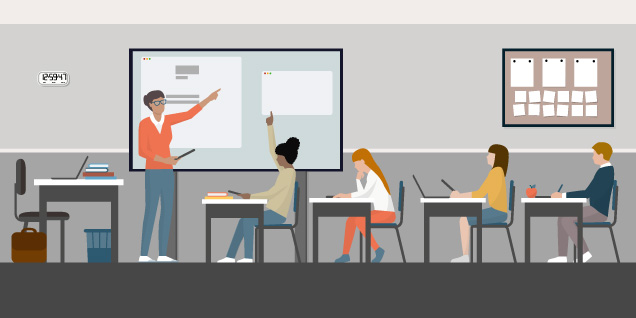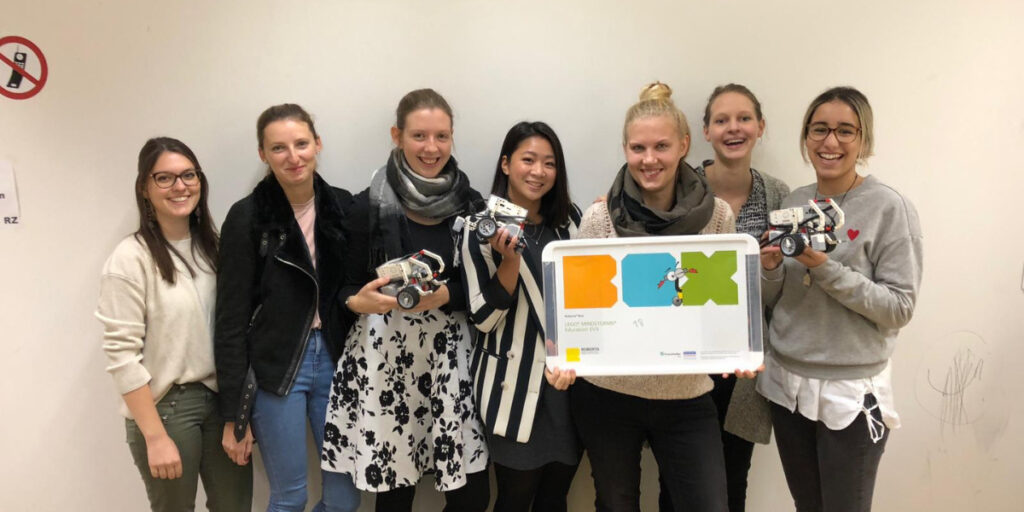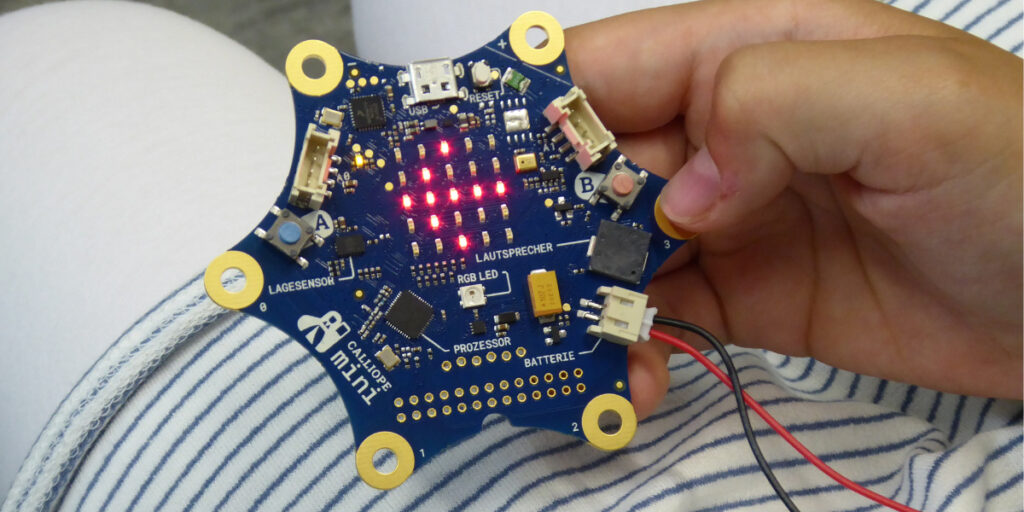
The Ada Lovelace Project is Rhineland-Palatinate’s center of excellence for women in the fields of science, technology, engineering, and mathematics (STEM). For a quarter of a century, the project has been working hard to promote the successful, effective and sustainable advancement of girls and women in the STEM fields. This is evidenced by the numerous and diverse partners with whom the project has worked very closely for many years: schools, colleges and universities in the state, regional companies, state and national initiatives, and state and local politics.
The goal for more than 25 years has been to enable girls and young women to make a stereotype-free choice of studies and careers and to encourage them to actively discover their interests and talents. The project thus makes an important contribution to greater equality, equal opportunities and innovation. The focus is always on the mentoring principle: the young women are provided with like-minded mentors who serve as role models for them. Female students from STEM programs or trainees in technical professions provide information about themselves, their course of study or their training and serve as motivating role models for the schoolgirls. They invite the girls and young women to the colleges and universities and to their companies, where they introduce them to STEM topics in an appealing way. And quite a few stay connected to the Ada Lovelace Project along the way – as a participant, mentor, alumna and ultimately successful STEM woman. They all carry Ada Lovelace’s legacy into the world with our motto: What I want, I can do!
The Ada Lovelace Project offers a very large number of very different courses in the four STEM fields throughout the country, from which female pupils, students and graduates can choose. At the project location University of Koblenz, due to the very close cooperation and partnership with the Roberta initiative of the Fraunhofer Institute for Intelligent Analysis and Information Systems IAIS and especially due to the large computer science department at the university itself, there is a central and important focus on the field of informatics in the STEM spectrum. For this reason, the Ada Lovelace Project at the University of Koblenz has been offering a variety of coding and programming workshops for girls and young women from elementary school onwards for more than 20 years now.
Why special support for girls and women is important
Boys already have a 30-point advantage over girls in mathematics when they enter secondary school. This increases to 50 points in the upper school. There are no differences between the genders in computer-related competencies at the time of transfer; it is not until entry into the upper school that the performance advantage of boys is 30 points. This seems to be mainly due to the gender-stereotyped choice of advanced courses, which further consolidates the differences and stands in the way of a later STEM career or study choice (cf. MINT-Nachwuchsbarometer 2022).
Our experience in our day-to-day project work, as well as the results of studies, show that the period between the 5th and 9th grade is particularly important, because it has been proven that interest in STEM topics and self-confidence in one’s own STEM skills decline in this age group. The already large gender gaps become even more entrenched during this period. The very different encouragement of girls’ and boys’ interest in technology has an aggravating effect, cementing the gender asymmetry in the choice of technical professions at an early age (cf. MINT-Nachwuchsbarometer 2015).
Upper secondary education is also immensely important, because it sets the course for a later professional career. The choice of an advanced course very often has an impact on the choice of a field of study. If students choose a STEM subject in high school, they are very likely to consider a career in the STEM field (cf. MINT-Nachwuchsbarometer 2022). Students who do not choose a STEM subject at this point will most likely not be motivated to pursue a corresponding career path.
In addition, girls usually make so-called “negative self-attributions” so that they develop no or only limited self-confidence in their abilities in the STEM field. This often leads to stereotypical gender images influencing career and study choices to such an extent that STEM professions and courses of study, which generally offer more lucrative employment and better opportunities for advancement, are perceived as purely male domains and are therefore not considered.

The concept of the Ada Lovelace Project: role models and practical experience
This is where we want to start and empower girls and young women with our project. In addition to the mentoring principle, practical experience is a very important approach in the Ada Lovelace project. The hands-on principle shows the participants what is possible with STEM, enables quick successes and thus reduces possible prejudices and inhibition thresholds. STEM topics become tangible and accessible in the truest sense of the word. Work is done together in small teams and without pressure. Here, people discuss with each other, search for solutions, tinker, construct and program. The event formats are diverse and take place both in school and in extracurricular contexts, such as vacation camps, school study groups or extracurricular projects.
Programming is the future
Digital media (smartphones, tablets, apps, etc.) accompany children and young people through school and everyday life – even more intensively since the pandemic. They learn to operate these devices from an early age, often exclusively as users. The coding and programming courses are designed to give children a deeper understanding of the technology behind them. The goal is to educate children and young people as early as possible to become digital sovereigns and the designers of tomorrow’s technology. This is all the more crucial as the upheavals taking place as a result of ongoing digitization become more noticeable and are already presenting today’s society with major challenges. Today’s students will encounter a completely new job market. It is therefore even more important to enable children to experience right at the start of their educational biography that they can be creators and do not have to remain mere consumers in the digital world.

A new round of the very popular coding and programming courses “RobertaLab” is currently starting at the University of Koblenz. The focus is on digital education and the promotion of these very skills, starting with the confident use of a PC and ending with an introduction to programming. Under the guidance of experienced mentors, all the important and basic STEM skills are taught in a playful way to 25 female students in grades 5-10 from the surrounding schools. A freely available graphical programming platform is also used, which allows an easy introduction to programming based on the graphical programming language NEPO. This enables participants to program the Calliope mini microcontroller or the EV3 robot from Lego Mindstorms, for example.
Highlights will certainly be the varied missions that let the Lego Roberta navigate on (virtual) Mars. Participants will also explore outer space and the planets of the solar system, as well as the topic of Artificial Intelligence.

But it is not only the schoolgirls who benefit. In the past, together with the University of Koblenz (Institute of Psychology and the Center for Teacher Education) and the State Pedagogical Institute in Rhineland-Palatinate, numerous advanced training courses were offered for teachers and trainee teachers in which programming skills were taught. In addition, students and, above all, mentors from the Ada Lovelace project are continuously trained at all project locations throughout the state in order to be able to offer the courses in the respective Open Roberta Coding Hubs. Over the past years, several hundred female students have been trained as Roberta teachers and scouts. Quite a few of the mentors go into teaching at the end of their studies and carry on the idea of the Ada Lovelace Project for many generations of students through their gender-sensitive STEM lessons.
Further information:
- The Ada Lovelace Project: https://www.ada-lovelace.de
- STEM Young Talent Barometer 2015 and 2022: https://www.acatech.de/publikationen/
- The Open Roberta Initiative: https://www.roberta-home.de/initiative/
